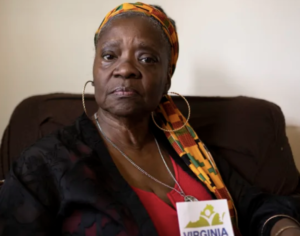
Barbara Jefferson Harris, a leader in the Norfolk Chapter and Virginia Organizing’s State Governing Board treasurer, courageously told her story to Suzannah Perry of the Virginian-Pilot for an important article about Black women’s reproductive rights and health care.
From the article:
Barbara Harris’ mother was 35 when she was sterilized by the state of Virginia in the 1960s.
“She could have a desire to get married, and have a family with her new husband. But she was not able to do that,” said Harris, a longtime nurse who now is executive treasurer for for Virginia Organizing, an advocacy group. “That choice was taken away from her.”
Her mother, a single parent, was threatened with loss of state aid for her four children if she didn’t get sterilized.
Between 7,200 and 8,300 people — 22% of whom were black — were sterilized in Virginia from 1927-1979 on grounds of homelessness, insanity or “unworthiness to procreate”.
Decades after the program ended, statistics show that women of color still have disproportionately negative outcomes relating to maternal health. Some advocates, including Harris, worry that the Supreme Court’s decision to overrule Roe v. Wade may make that situation even worse if abortion becomes illegal in Virginia.
“This country doesn’t show up for us,” said Cierra Lewis, an abortion-rights advocate from Norfolk. “We fight. That’s the thing — Black women, we fight for ourselves, we fight for our community, we will advocate for our neighborhoods.
“I won’t say we know something is happening before it happens, but I feel like some things will hit us first, and then we see the trickle-down effect when feminists become outraged because it hits them. This has hit us before.”
In 2012, the most recent year for which Virginia data are available, Black women were 2.7 times more likely to terminate a pregnancy than their white counterparts. While 17.8 pregnancy-related deaths occurred for every 100,000 live births among white women in Virginia, among Black women, that rate was 45.8 deaths.
These continually disproportionate figures in Black and white maternal mortality are actually an improvement from pre-Roe numbers, according to a paper signed by 154 economists and submitted to the U.S. Supreme Court as an Amicus Brief in support of abortion rights in Dobbs vs Jackson Women’s Health Center.
The brief notes that Black women experienced a 28% to 40% decline in maternal mortality due to the legalization of abortion.
Dr. David Peters, an abortion provider at Tidewater Women’s and LGBT Health Center in Norfolk, said high maternal death rates are among the reasons pregnant people may choose to have an abortion.
“The simple fact is women and children die during labor,” Peters said. “The amazing thing is that with everything we have in America, we have one of the worst maternal mortality rates in the world. And now they’re going to start forcing women to have children. There’s no sense to this whatsoever.”
In a study published in early 2022 by the Commonwealth Fund, women in the U.S. were found to have a higher maternal mortality rate than women in ten other wealthy nations surveyed at a rate of 23.8 deaths per 100,000 births. In Black women, that rate was 55.3 deaths per 100,000 live births.
“The women who could least afford to have another baby are the ones most affected by by these abortion bans,” Peters said. “Your average upper middle class person with health insurance, their doctor is going to find a way to get them an abortion. It’s always been that way through history, and I’m sure it will continue that way. It is the lower socio-economic individuals that can least afford a pregnancy that are the most impacted.”
Dr. Anila Ricks-Cord, an OBGYN who works in El Paso, Texas, said she already has seen the consequences of that state’s abortion restrictions, especially on poor women. Her post-Dobbs reality is treating women who can’t afford out-of-state abortions and find extra-legal ways to terminate a pregnancy, yet fear prosecution should they visit an emergency room if they experience complications. She said she worries some women will die rather than risking medical care..
“Poor people utilize the emergency room as their doctor’s office. And a lot of people don’t come unless they are hearing their ancestors, Jesus and angels call their name,” Ricks-Cord said. “As an emergency room OBGYN, I have seen the gamut of people practically on death’s door for various and sundry reasons related to being female, and bleeding and having complications with pregnancy or complications with surgery as a consequence. I see that this is just gonna get worse.”




